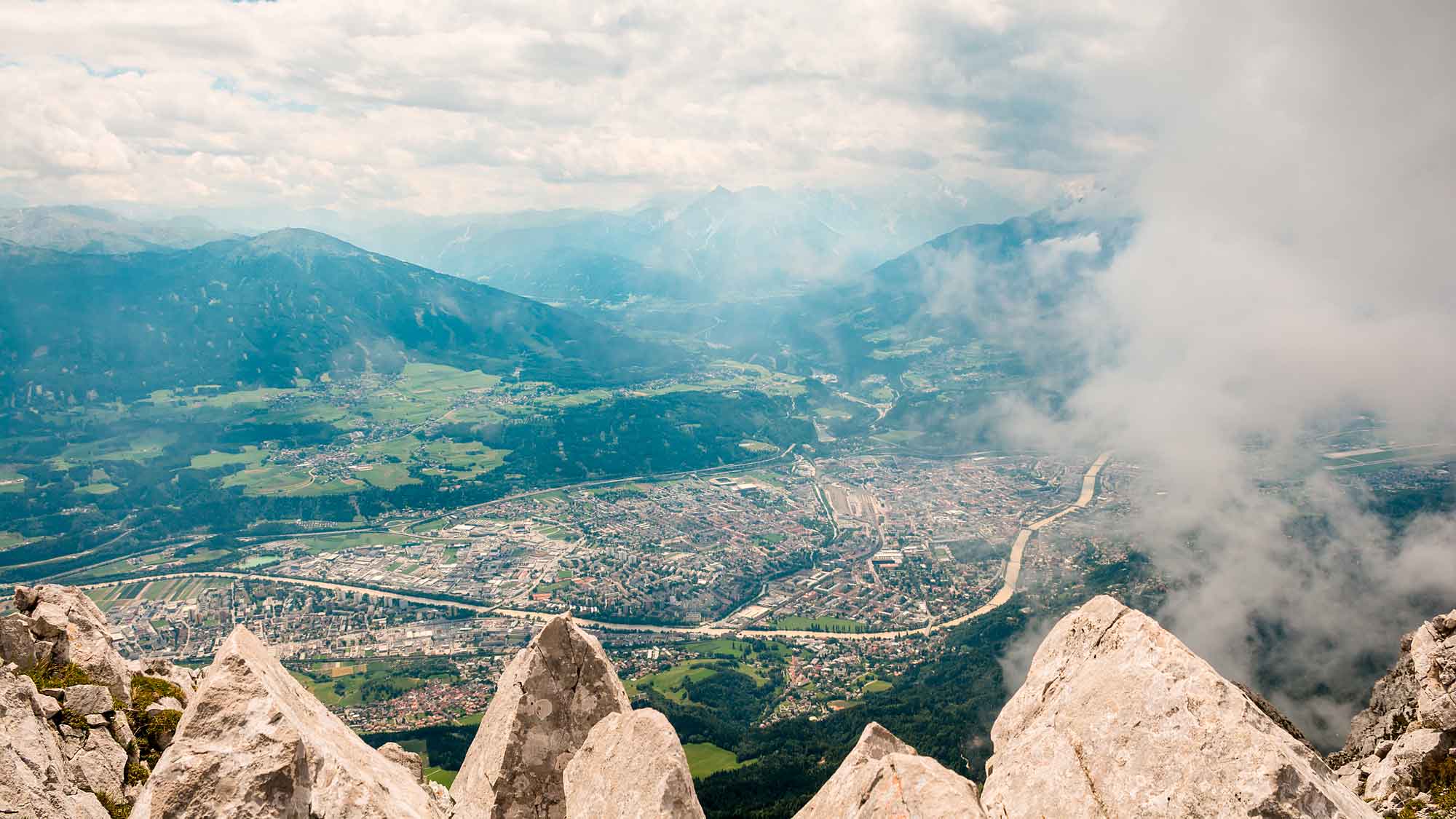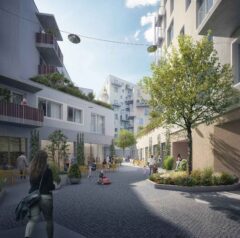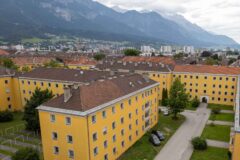In the Alps, the impact of climate change is being felt in numerous ways, including melting glaciers and extreme weather events bringing heavy rain and mudslides. The city of Innsbruck is doing a great deal to save energy and resources and reduce harmful emissions. Nestled in the mountains, Innsbruck has little space to spare but an urgent need for more housing. Balancing climate protection with affordable accommodation is one of the major challenges the city is currently facing.
“Innsbruck’s housing market is very tight,” says Marcus Maier, who heads the project for the mission “Climate-neutral City”. “Urbanisation and sustainable land use are key issues in the city’s development. We need much more new and affordable accommodation, e.g. for students. But building student and social housing while remaining on course for climate neutrality, i.e. laying the foundations for funding a high-quality building standard, is a tough task. Because we’re short on space, renovating existing buildings also plays a major role, of course.” A number of showcase new construction and renovation projects are demonstrating how innovative solutions work in practice. The city is planning and delivering these kinds of construction projects in close cooperation with its partners, namely its subsidiary IIG (Innsbrucker Immobilien GmbH & Co KG) and Neue Heimat.
Campagne Reichenau – a smart city district
The Campagne Reichenau district is one example of best practice for sustainable residential development and building affordable homes to a passive-house standard. The long-term aim is to create a “zero-emission urban region”, a concept that involves reducing greenhouse gas emissions, adapting to climate change, embracing social sustainability, maximising energy efficiency and ecological quality, and using renewable energy as an essential component of the energy supply system. Affordable, highly efficient solutions that can readily be multiplied have been developed here under the leadership of IIG. As well as optimising the energy efficiency of the buildings, sustainable mobility concepts and smart supply and waste disposal structures are also being trialled in the new district. The first few stages of the construction work have already undergone klimaaktiv certification and have been awarded the gold standard. “Campagne Reichenau is also one of the first places in Austria to achieve a klimaaktiv rating covering an entire housing estate,” Marcus Maier explains. “We scored particularly highly in four areas: management, communication, urban development and building quality.” IIG’s Buildings A and B were also certified as passive houses in line with the PHI standard.
The Eichhof district – renovation and new buildings to passive-house standard
Another project that is breaking new ground can be found in Innsbruck’s Eichhof district. In several stages, a total of 530 housing units – some in new buildings that meet passive-house standards and some in renovated existing buildings – are being created on the site of a residential estate in the city that was initially constructed from 1941 onwards to house new arrivals from South Tyrol whose families had Austrian roots. 2021 saw residents moved into the first complex, containing 29 units, with a further 32 high-quality, highly energy-efficient newly constructed apartments being handed over to tenants in 2023. The aim is for the future construction stages to achieve the klimaaktiv gold standard.
Building skills and sharing knowledge
Being part of the mission “Climate-neutral City” is helping Innsbruck to forge ahead with its process for achieving climate neutrality. Additional staff have been recruited to this end, with the four-strong Pioneering City team based at administration headquarters – specifically, in the office of the municipal directorate. This makes internal cooperation with the various offices and the organisational procedures significantly easier. “Our job is to integrate the climate criteria more closely into our administrative processes, look for implementation opportunities, and identify and eliminate legal obstacles, e.g. in building regulations,” Marcus Maier says, describing some of the new team’s responsibilities. Communication, building networks and sharing information are key, not only with regard to the processes under way within the city but also in terms of cooperation with a wide range of stakeholders, the subsidiaries and the provincial government departments as well as with universities and research institutions.Forschungseinrichtungen.
Marcus Maier, project lead for the mission “Climate-neutral City”,
Innsbruck City Council“,
Landeshauptstadt Innsbruck
Participation of citizen
Keeping the public informed and getting them involved are crucial to the success and acceptance of climate-related projects. A range of awareness-raising measures have therefore been launched in Innsbruck’s new neighbourhoods, such as accompanying residents moving into their new apartments or providing specific information on how to save energy. The cooperative planning procedure for the newly built Campagne Reichenau district proved a roaring success. “Locals were asked in advance what they needed in terms of schools, nurseries, clubs and so on, and what was created was a spacious site with many green spaces and play areas,” says Maier, describing the process. “This allowed any pushback – which, as we all know, you get very often with new building projects – to be resolved at an early stage. Participatory planning processes like these, where people discuss things together right from the start, are something we also want to make more use of in future projects.”
The klimaaktiv building standard was developed in Austria to enable a building’s quality to be measured and compared. The various rating categories are set out in a catalogue of criteria. Besides energy efficiency, an objective appraisal and assessment is also conducted for planning and implementation quality, the quality of construction materials and design, and key aspects of comfort, convenience and indoor air quality.
www.klimaaktiv.at/gemeinden/gemeindegebaeude/gebauedestandard.html
The klimaaktiv standard for housing estates and districts is an Austria-wide quality standard that demonstrates and ensures the sustainability of large-scale building projects, with a particular focus on climate neutrality and quality of life. Central to the catalogue of criteria for housing estates and districts is the issue of urban development, while other aspects are geared towards the quality of infrastructure (mobility infrastructure, energy and water supply, buildings) and the quality of planning processes (including organisational structures, objectives and formats for participation).
www.klimaaktiv.at/service/publikationen/bauen-sanieren/kriterienkatalog-siedlungen.html


